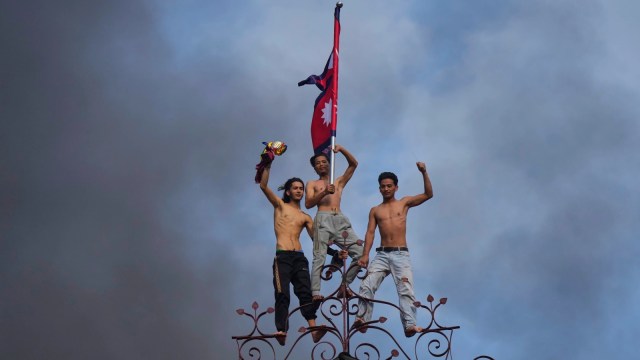
What intrigues me about the revolution in Nepal being led by angry, young people is how they have turned #nepokidz into a rallying cry. The habit of breeding nepo-babies that nearly all political leaders in this sub-continent embrace makes me personally very angry. So, I have sympathy for all jobless, despairing young people without being an advocate of anarchy. Nepal’s ‘Gen-Z’ seems to have been enraged about nepotism for a long while and have expressed these feelings on social media.
Unsurprisingly, it was the ban on social media that acted as a trigger for the anarchy we saw play out in the streets of Kathmandu and spread slowly into rural districts. A young man from Nepal who works in Mumbai told me that he had an aunt who was a rural politician and she had been advised to go into hiding when they saw how the uncontrollable violence in Kathmandu forced the prime minister to resign.
Since monarchy was abolished in Nepal in 2008, there have been four elections and 14 prime ministers. Most prime ministers came from communist or Leftist political parties. They should have known better than to immediately start behaving like kings in a country that had got tired of kings. But, just as we in India have found it hard to shake off colonial governance and colonial bureaucracies, it appears that in Nepal, they have found it hard to come to terms with the idea that democracy should not produce rulers, but servants of the people. What happens in Nepal is something that interests me less than what could happen in our own ancient and wondrous land if our political leaders do not correctly read the smoke signals rising from the burned government buildings in Kathmandu.
As someone who has spent most of the years of my life in Lutyens’ Delhi, I have had a ringside view of what goes on in the homes of our most powerful political leaders. This has enabled me to witness with my own eyes how political leaders become inexplicably rich as soon as they are ensconced in this most exclusive of India’s residential enclaves. When I was a child, almost the only people who lived here were families who technically inherited ‘old money’ but who in truth lived in genteel poverty. Today, almost the only people who can afford to live here are politicians, high officials and billionaires.
Taxpayers should know how much the homes of our ‘humble’ politicians cost today. On doing a little research, I learned that Jawaharlal Nehru’s one-time home on Motilal Nehru Marg, formerly York Road, is to be sold for Rs 1,100 crore, potentially making it the most expensive residential real estate transaction in India’s history. Renting a Lutyens’ bungalow costs a minimum of Rs 3 lakh a month and could go up to Rs 30 lakh a month. Long years ago, when Narendra Modi first became prime minister, I asked Arun Jaitley when Modi was going to start making commercial use of the most valuable real estate in our country and he said, “Not now, in his second term.”
He is now in his third term and there is no sign of this happening. It goes without saying that children brought up like royalty in homes that our former Princes can no longer afford will grow up as nepo-babies. And they do. I cannot remember when I last met a senior political leader or bureaucrat whose children did not go to the finest universities in the West. When I have dared ask how they afford spending so much on their children’s education, I have nearly always been told that their children got scholarships.
What is noteworthy about nepo-babies is that despite their expensive education they somehow never manage to get real jobs and usually wait to inherit Mummyji or Daddyji’s political party. It would not be untrue to describe the INDIA coalition as a nepo-babies private club. Meanwhile, in Modi’s team, we have senior ministers in his cabinet who have managed to get their own nepo-babies important (and lucrative) positions in sports bodies and think tanks. All these nepo-babies are doing well. As did those born in socialist, secular times in which most other Indians lived in extreme poverty.
As a ‘veteran’ political columnist I have watched with growing alarm the way countries around us have exploded ostensibly for different reasons. Sri Lanka’s young people revolted against a corrupt political dynasty. Bangladesh exploded because of an autocrat who refused to allow fair elections and Nepal has exploded because young people got fed up with being destitute and desperate while their elected leaders allowed their #nepokidz to buy designer clothes and jewels and flaunt them in the rivieras of the jet set.
If we do not want this ‘revolution in the air’ to seep across the border into our own dear Bharat Mata, it is about time that someone at the top starts to pay careful attention to the voices we heard in the streets of Kathmandu last week. Narendra Modi won his first election by promising that he would lead the charge against corruption and nepotism. “Na khaoonga, na khaane doonga,” he used to say at those long-ago rallies when he won the hearts of Indian voters by promising not just an end to corruption, but also change and prosperity. It is time that he rehearsed his old lines and repeated them again.